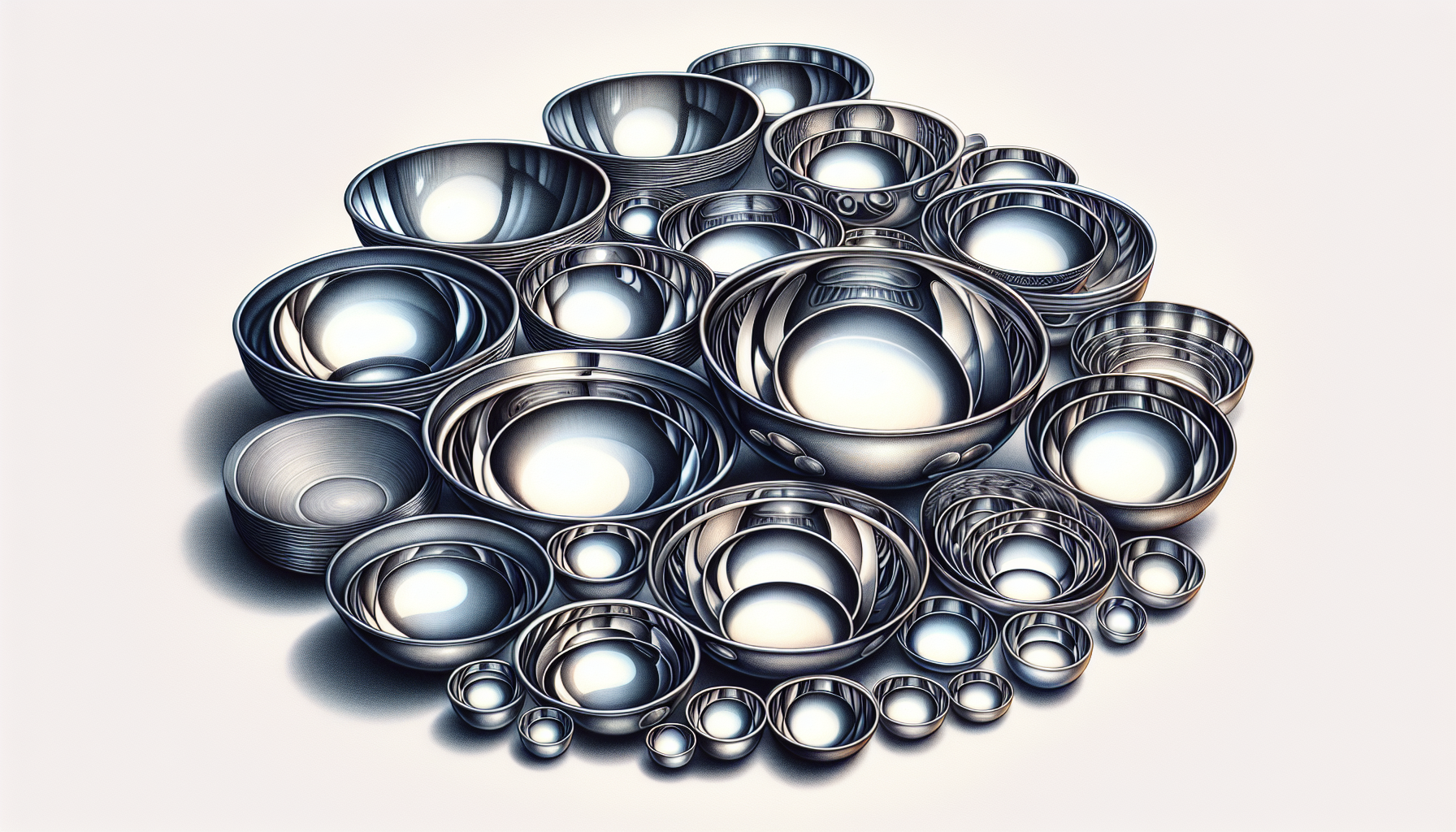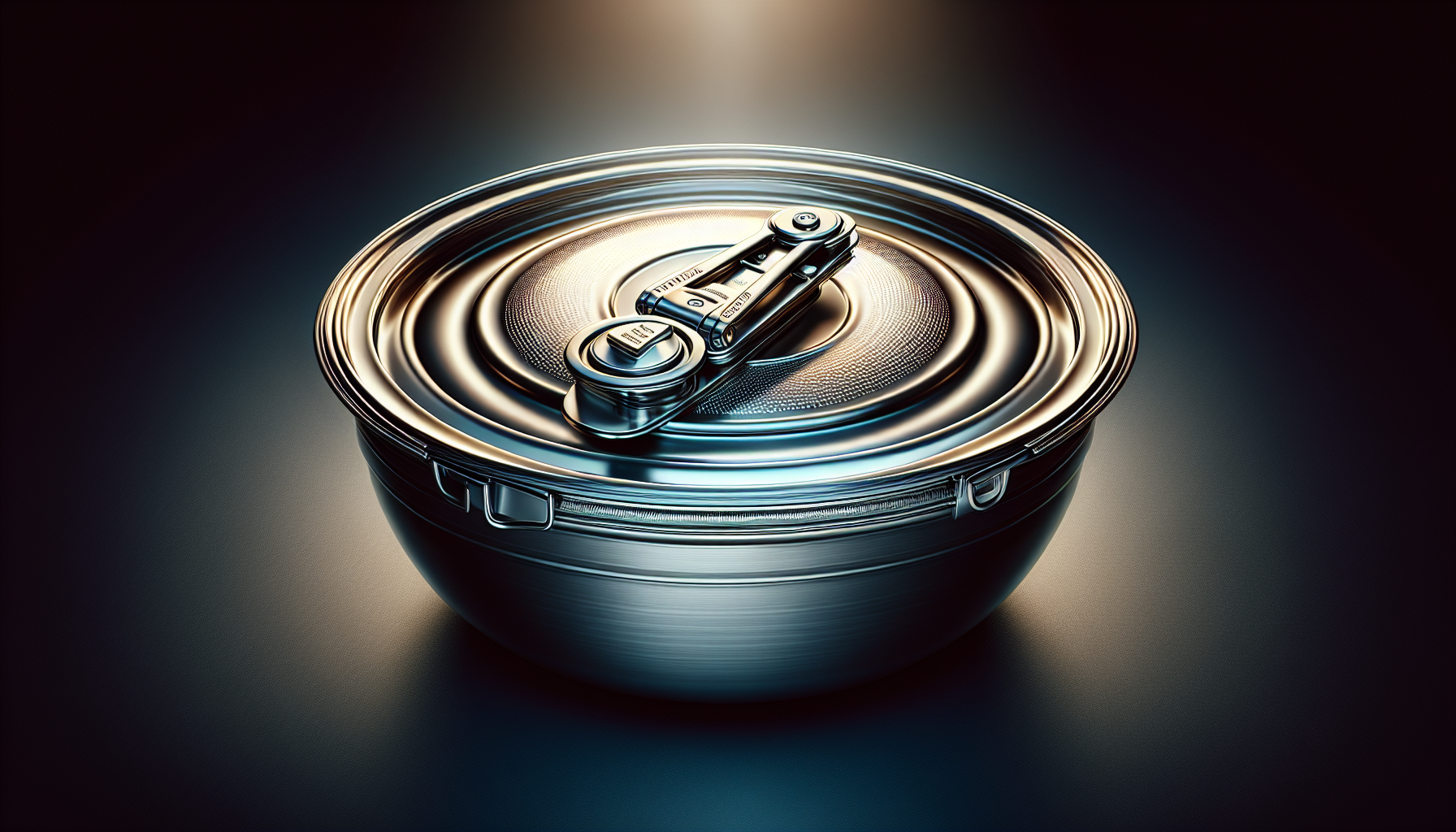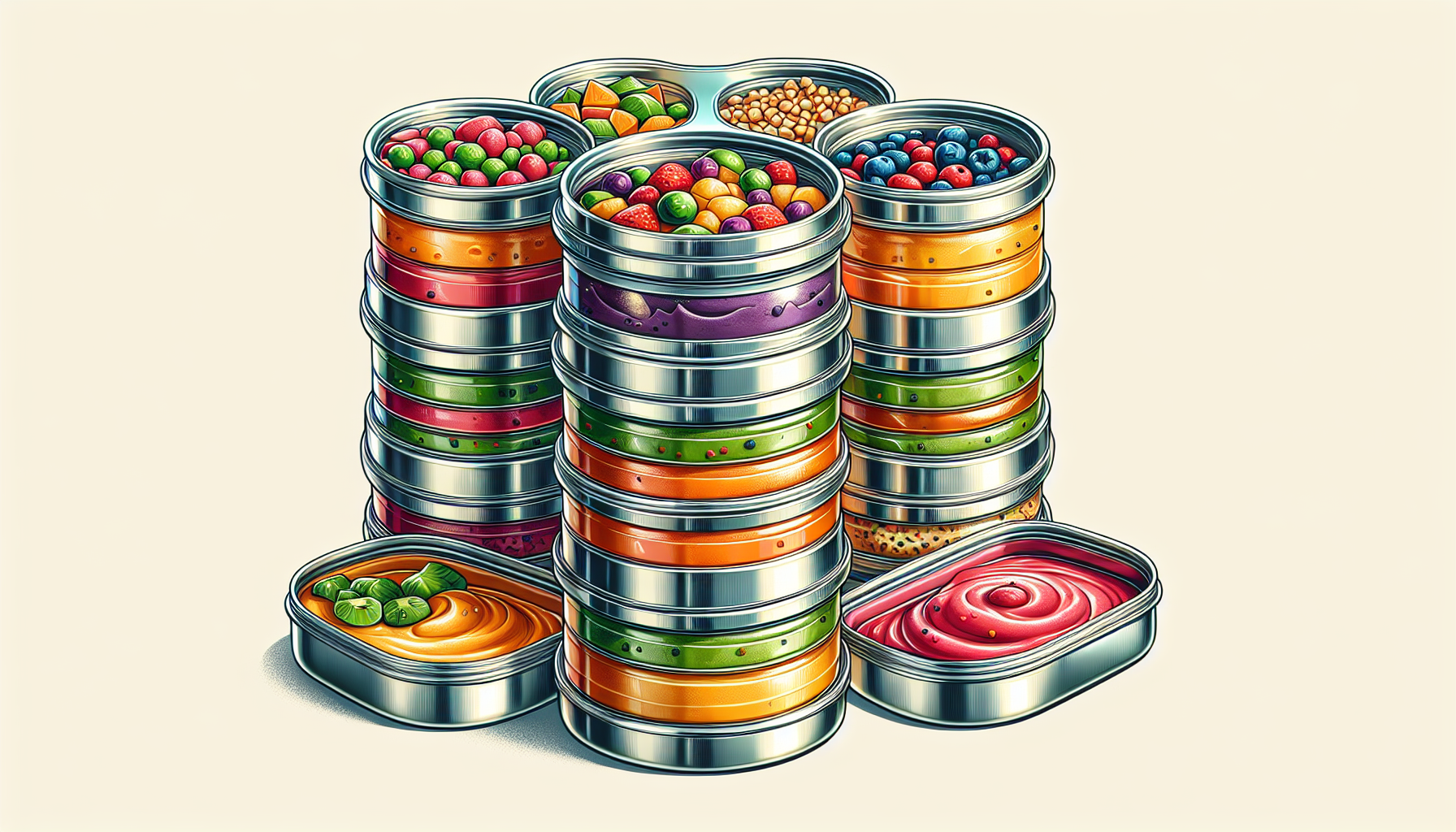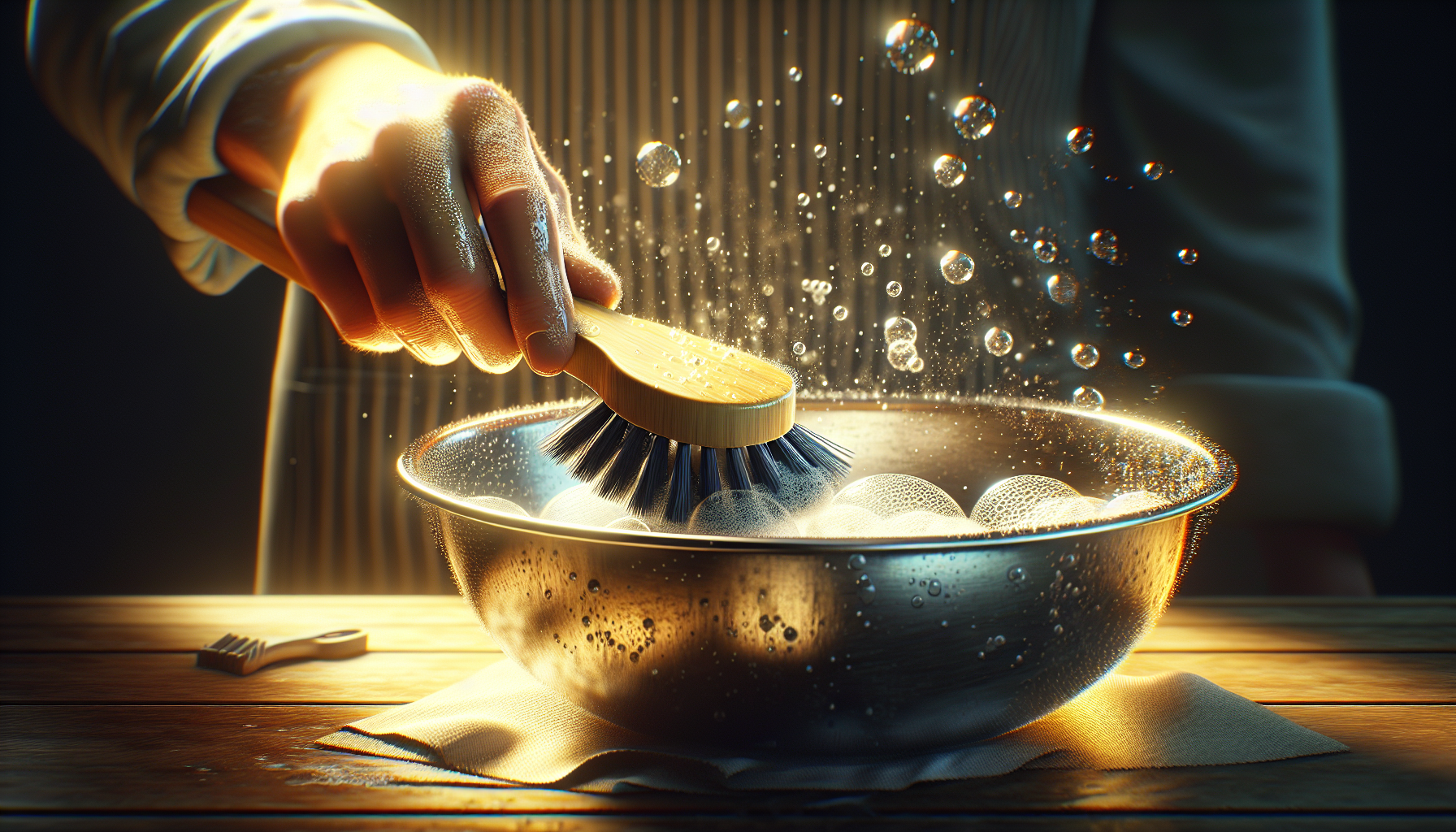If you’re questioning “are stainless steel bowls safe to store food?”, rest assured, they’re a dependable choice. Stainless steel is valued for its non-reactive nature and resistance to chemical leaching, ensuring that your food stays unaltered in taste and quality. Read on to uncover the full extent of their safety features and practical benefits in food storage.
Key Takeaways
- Stainless steel bowls are non-reactive and safe for storing various types of food, including acidic foods, ensuring flavor and quality retention.
- Stainless steel containers are durable, easy to clean, hygienic, versatile in use, and more environmentally friendly compared to single-use plastic containers.
- Regular maintenance of stainless steel bowls, including using non-abrasive cleaning methods, is essential for their longevity and to keep them in optimal condition.
The Safety Profile of Stainless Steel Bowls for Food Storage

Stainless steel containers have carved a niche for themselves in the world of food storage with their unique safety profile. Unlike plastic and glass bowls, stainless steel bowls are non-reactive, meaning they don’t react with the food stored in them, ensuring the maintenance of flavor and edibility. This non-reactivity is a significant advantage when storing acidic foods like citrus fruits and vinegar, which can react with other materials and alter their taste.
Non-Reactivity: A Key Factor
This non-reactivity is not just beneficial for the food but also for the container itself. It ensures that stainless steel bowls remain undamaged and long-lasting, even when used to store acidic or alkaline foods.
This inert nature of stainless steel prevents any unfavorable reactions with the food, thereby preserving its color and flavor, making your meals taste just as good as when you first prepared them.
Chemical Safety: No Leaching Worries
Another notable feature of stainless steel is its non-leaching property. Unlike plastic containers that can leach harmful chemicals into food, especially when heated, stainless steel is largely inert and does not interact with the food stored in it. This ensures that your food remains free from contamination, retaining its quality and safety.
Food Grade Standards: Ensuring Quality
Food-grade stainless steel, such as types 304 or 316, is designed specifically for safe food storage. It is not just stainless steel, but also:
- Durable
- Corrosion-resistant
- Nonabsorbent
- Able to withstand repeated cleaning without degrading or contaminating food
This high resistance to various chemicals, including acids, alkalis, and chlorides like salt, make it well-suited for food storage.
Advantages of Using Stainless Steel Mixing Bowls Over Other Materials

While the safety profile of stainless steel bowls is impressive, their practical advantages over other materials further enhance their appeal. For instance, compared to glass bowls, stainless steel mixing bowls are lightweight and practically indestructible, making them more durable and convenient.
Durability That Lasts
Stainless steel bowls are constructed to be extraordinarily strong and can handle storing heavy items or surviving significant falls without cracking or breaking. Moreover, unlike some other materials that may degrade and release chemicals into food, a stainless steel bowl maintains its integrity even at high temperatures.
Hygienic and Easy to Clean
When it comes to hygiene, stainless steel bowls offer distinct advantages:
- They are dishwasher safe
- They do not absorb food odors, ensuring a clean and odor-free environment for food prep and storage
- Being non-porous, these bowls do not allow bacteria from food to enter their surface, enhancing their sanitary benefits and contributing to a longer service life.
Versatility in the Kitchen
Stainless steel bowls are versatile kitchen tools that can be used for a wide array of cooking methods. Here are some ways you can use them:
- Mixing ingredients
- Serving salads and snacks
- Marinating meat
- Proofing dough
- Whisking eggs
- Melting chocolate
- Steaming vegetables
These glass mixing bowls are a handy tool in any kitchen, perfect for use as a mixing bowl when preparing your favorite recipes.
Plus, some stainless steel bowls come with airtight lids, enhancing food freshness and providing the option for storing food and meal prep in advance.
Practical Features of Stainless Steel Bowls for Everyday Use

Aside from their safety and versatility, stainless steel bowls also boast practical features that make them ideal for everyday use. They often come in sets featuring a range of sizes, catering to various storage requirements, making them a staple in any kitchen.
Leak-Proof Lids for Secure Storage
One such practical feature is the leak-proof lid. High-quality stainless steel containers are air-tight and leakproof, ensuring your food remains safe for consumption. These lids not only secure the food inside but also enhance the convenience as these bowls with varying sizes neatly nest within each other, saving storage space.
Lightweight and Maneuverable
Another notable feature of these bowls is their lightweight design, ensuring convenient handling and ease of storage. Moreover, some stainless steel mixing bowls come equipped with non-slip bases, which provides added stability and makes them less prone to sliding, simplifying both use and cleaning.
Eco-Friendly Choice
In terms of environmental impact, stainless steel bowls outshine disposable plastic containers. These bowls are durable, long-lasting kitchen tools that reduce the need for disposable kitchenware. Moreover, stainless steel is recyclable, which enhances its environmental sustainability compared to single-use plastics that add to landfill waste.
The Role of Stainless Steel Containers in Special Diets

Stainless steel containers also play a crucial role in special diets, such as baby care and allergen-free food storage. For instance, stainless steel containers safe for baby bottles and food storage are preferred due to their chemical-free and hygienic properties.
Stainless Steel in Baby Care
When it comes to baby care, stainless steel baby bottles are a safe and durable choice, made from food-grade materials. They are often designed with a wide mouth for easy filling and feature a contoured shape for comfortable handling.
Allergen-Free Food Storage
For those managing food allergies, the non-reactive nature of stainless steel helps prevent cross-contamination and is ideal for allergy-friendly food storage.
The non-porous nature of stainless steel means that it does not retain allergens or bacteria, making it an excellent choice for allergy-friendly food storage.
Maintaining Your Stainless Steel Bowls for Optimal Safety

While stainless steel bowls offer numerous benefits, proper maintenance is key to ensure their safety and longevity. For instance, they should be thoroughly washed before their first use to remove any residue from the manufacturing and polishing process.
Cleaning and Care Best Practices
For cleaning, these bowls can be safely washed in a dishwasher or manually with soap and water. Non-abrasive sponges are recommended, and products like Bar Keepers Friend can be used for removing stains and tarnish.
Avoiding Common Pitfalls
Like any other kitchen tool, stainless steel bowls can show signs of wear and tear. However, new bowls may show:
- Scratches
- Fingerprints
- Water marks
- Tarnish
But these marks generally lessen with regular use and proper non-abrasive cleaning.
Summary
In conclusion, stainless steel bowls are a practical, durable, and safe choice for food storage. They offer numerous advantages over other materials, including their non-reactive nature, chemical safety, durability, and convenience. Moreover, their practical features like leak-proof lids, lightweight design, and eco-friendliness make them an ideal choice for everyday use and special diets.
Frequently Asked Questions
What foods should not be stored in stainless steel?
You should avoid storing acidic foods like tomatoes, citrus fruits, or vinegar-based dressings in stainless steel containers for a prolonged period of time. This is because the acid can react with the metal.
Is it safe to store food in stainless steel containers in the refrigerator?
Yes, it is safe to store food in stainless steel containers in the refrigerator as they do not absorb bacteria or leach chemicals, providing peace of mind for your health. Stainless steel is non-staining and non-porous, making it a safe option for food storage.
Can stainless steel bowls be used in the microwave?
No, it's not safe to use stainless steel bowls in the microwave as it can cause sparking and damage.
Are stainless steel bowls suitable for baby care?
Stainless steel bowls are suitable for baby care because they are chemical-free and hygienic, making them safe for baby bottles and food storage.
Are stainless steel bowls suitable for people with food allergies?
Stainless steel bowls are suitable for people with food allergies because their non-reactive properties prevent cross-contamination.
You Might Also Like...










